Articles
- Page Path
- HOME > J Korean Acad Nurs > Volume 41(1); 2011 > Article
-
Original Article
- A Comparison between Effects of Aroma Massage and Meridian Massage on Constipation and Stress in Women College Students
- Miyoung Chung, Euysoon Choi
-
Journal of Korean Academy of Nursing 2011;41(1):26-35.
DOI: https://doi.org/10.4040/jkan.2011.41.1.26
Published online: February 28, 2011
1Full-time Lecture, Department of Nursing, Sunmoon University, Asan, Korea.
2Professor, College of Nursing, The Catholic University of Korea, Seoul, Korea.
- Address reprint requests to: Choi, Euysoon. College of Nursing, The Catholic University of Korea, 505 Banpo-dong, Seocho-gu, Seoul 137-701, Korea. Tel: +82-2-2258-7401, Fax: +82-2-2258-7772, eschoi@catholic.ac.kr
© 2011 Korean Society of Nursing Science
Abstract
-
Purpose
- This study was done to compare the effects of abdominal aroma massage and meridian massage on constipation and stress in college women with functional constipation.
-
Methods
- The participants were 38 college women, 18 were in the aroma group and 20 in the meridian group. The aroma massage was given using aroma oil which was a mixture of lemon, lavender, rosemary, and cyprus. The meridian massage was given at 9 accupoints which influence intestinal functions. The treatment was given 5 days a week for 4 weeks. A constipation severity score, weekly defecation frequency, and a stress response score were measured before and every week of 4 weeks of the experiment.
-
Results
- While there was no significant difference between two groups, there was a significant difference within the groups in the constipation severity (aroma group: 1st week, meridian group: except 4th week), defecation frequency (aroma group: 3rd week, meridian group: 2nd and 3rd week), and stress (aroma group: all weeks, meridian group: except 4th week) after different duration of experiment.
-
Conclusion
- Based on these results, both abdominal massages relieved constipation and stress. Resorting to either types of massage will contribute to the reduction of use of stool softeners, suppositories, or enemas.
This article is a revision of the first author's doctoral thesis from the Catholic University of Korea.
- 1. Ayaş S, Leblebici B, Sözay S, Bayramoğlu M, Niron EA. The effect of abdominal massage on bowel function in patients with spinal cord injury. American Journal of Physical Medicine and Rehabilitation. 2006;85:951–955.ArticlePubMed
- 2. Castledine G, Grainger M, Wood N, Dilley C. Researching the management of constipation in long-term care: Part 1. British Journal of Nursing. 2007;16:1128–1131.ArticlePubMed
- 3. Faul F, Erdfelder E, Lang A, Buchner A. G*Power 3: A flexible statistical power analysis program for the social, behavioral, and biomedical sciences. Behavior Research Methods. 2007;39:175–191.ArticlePubMedPDF
- 4. Harrington KL, Haskvitz EM. Managing a patient's constipation with physical therapy. Physical Therapy. 2006;86:1511–1519.ArticlePubMedPDF
- 5. Jeong SY, Jung HM. The effects of abdominal meridian massage on constipation among CVA patients. Journal of Korean Academy of Nursing. 2005;35:135–142.ArticlePubMedPDF
- 6. Jun DW, Lee OY. A population-based study on bowel habits in a Korean community: Prevalence of functional constipation and self-reported constipation. Korean Journal of Neurogastroenterology and Motility. 2006;12:181–182.
- 7. Kim DH. Introduction of meridian massage. 1997;Seoul, Korea Massage Institute.
- 8. Kim DS, Choi IJ, Ha WC, Lee HZ, Park NH. The effect of abdominal meridian massage on constipation and depression of hemiplegic patients. Clinical Nursing Research. 2004;10(1):70–81.
- 9. Kim I, Cho YN. The effects of abdominal meridian massage on constipation in institutionalized psychiatric patients taking antipsychotic drugs. Journal of Korean Academy of Adult Nursing. 2007;19:809–818.
- 10. Kim JH, Park JS. The effects of abdominal meridian massage on the degree of constipation among the patients with immobility after orthopedic surgery. Clinical Nursing Research. 2006;12(2):63–72.
- 11. Kim JY, Kim OY, Yoo HJ, Kim TI, Kim WH, Yoon YD, et al. Effects of fiber supplements on functional constipation. The Korean Journal of Nutrition. 2006;39:35–43.
- 12. Kim MA, Sakong JK, Kim EJ, Kim EH, Kim EH. Effect of aromatherapy massage for the relief of constipation in the elderly. Journal of Korean Academy of Nursing. 2005;35:56–64.ArticlePubMedPDF
- 13. Kim MJ, Jeon HJ. Oriental acupuncture. 2006;Seoul, Jungdammedia.
- 14. Kim YK. The effects of abdominal meridian massage on constipation. 2002;Busan, Pusan National University. Unpublished master's thesis.
- 15. Kim YS. Effects of meridian massage on the relief of stress. 2005;Gwangju, Kwang Ju Women's University. Unpublished master's thesis.
- 16. Klauser AG, Flashentrager J, Gehrke A, Müller-Lissner SA. Abdominal wall massage: Effect on colonic function in healthy volunteers and in patients with chronic constipation. Zeitschrift für Gastroenterologie. 1992;30:247–251.
- 17. Koh KB, Park JK, Kim CH. Development of the stress response inventory. Journal of Korean Neuropsychiatric Association. 2000;39:707–719.
- 18. Lämås K, Lindholm L, Stenlund H, Engström B, Jacobson C. Effects of abdominal massage in management of constipation-a randomized controlled trial. International Journal of Nursing Studies. 2009;46:759–767.ArticlePubMed
- 19. Lee SH. Effects of back massage with lavender essence oil on the stress response of the ICU nurses. Journal of Korean Academy of Nursing. 2001;31:770–780.ArticlePDF
- 20. Liu Z, Sakakibara R, Osaka T, Uchiyama T, Yamamoto T, Ito T, et al. Mechanism of abdominal massage for difficult defecation in a patient with myelopathy. Journal of Neurology. 2005;252:1280–1282.PubMed
- 21. Oh HG. Dr Oh's aromatherapy. 2000;Seoul, Yangmoom.
- 22. Preece J. Introducing abdominal massage in palliative care for the relief of constipation. Complementary Therapies in Nursing and Midwifery. 2002;8:101–105.ArticlePubMed
- 23. Rao SS. Constipation: Evaluation and treatment of colonic and anorectal motility disorders. Gastrointestinal Endoscopy Clinics of North America. 2009;19(1):117–139.ArticlePubMed
- 24. Seo SY. A study on social-psychological analysis by SCL-90-R and complementary and alternative medicine used by patients with constipation. 2008;Seoul, Korea University. Unpublished master's thesis.
- 25. Shirreffs CM. Aromatherapy massage for joint pain and constipation in a patient with Guillian Barré. Complementary Therapies in Nursing and Midwifery. 2001;7:78–83.ArticlePubMed
- 26. Snyder M, Lindquist R. Complementary/alternative therapies in nursing. 2002;4th ed. New York, Springer Publishing Company.
- 27. Thompson WG, Lonstreth GF, Drossman DA, Heaton KW, Irvine EJ, Müller-Lissner SA. Functional bowel disorders and functional abdominal pain. Gut. 1999;45:II43–II47.ArticlePubMedPMC
- 28. Varma MG, Wang JY, Berian JR, Patterson TR, McCrea GL, Hart SL. The constipation severity instrument: A validated measure. Diseases of the Colon and Rectum. 2008;51:162–172.ArticlePubMed
- 29. Yang YH. The effect of aromatherapy-meridian massage on the relief of constipation and the reduction of stress in patients with stroke. 2006;Seoul, Kyung Hee University. Unpublished master's thesis.
- 30. Zhang Y, Zhang YL, Cheng YQ. Clinical observation of constipation due to deficiency of vital energy treated by massage and finger pressure method. Zhonghua Hu Li Za Zhi. 1996;31(2):97–98.PubMed
REFERENCES
Figure & Data
REFERENCES
Citations

- The Effects of Abdominal Meridian Massage on Abdominal Distention, Pain, and Recovery of Bowel Motility after Sedated Colonoscopy
Woo Hyun Jo, Myo Sung Kim
Journal of Korean Academy of Fundamentals of Nursing.2022; 29(1): 12. CrossRef - Complementary and Alternative Therapies for Pregnant Women Suffering from Constipation: A Systematic review
Ayça ŞOLT, Sena Dilek AKSOY
International Journal of Traditional and Complementary Medicine Research.2021; 02(02): 101. CrossRef - Effects of the Healing Beats Program among University Students after Exposure to a Source of Psychological Stress: A Randomized Control Trial
Jiah Song, Wonjong Kim, Iklyul Bae
International Journal of Environmental Research and Public Health.2021; 18(21): 11716. CrossRef - Effectiveness of Aromatherapy in Alleviating Palliative Symptoms and Its Possible Side Effects: A Literature Review
Heidrun Männle, Birthe Osorio, Karsten Münstedt
OBM Integrative and Complementary Medicine.2020; 05(02): 1. CrossRef - The effects of aroma massage and foot bath on psychophysiological response in stroke patients
Jeong Hoon Lee, Eun Kyung Seo, Jae Soon Shim, Sung Pil Chung
Journal of Physical Therapy Science.2017; 29(8): 1292. CrossRef - Effects of Aromatherapy Footbath on Stress and Autonomic Nervous System Activity
Ju-mi Ahn, Myung-Haeng Hur
Korean Journal of Stress Research.2017; 25(4): 239. CrossRef - Effects of 10 % Lidocaine Spray and Aroma Hand Massage on Pain, Anxiety, Blood Pressure, and Pulse During Arteriovenous Fistula Needling in Hemodialysis Patients
Ji Mi Song, Hye-Ja Park
The Korean Journal of Rehabilitation Nursing.2016; 19(1): 1. CrossRef - Effect of Acupressure on Bowel Elimination in Patients with Skeletal Traction
SH Ghiyasvandian, F Jalali niya, M Fadaei Dehcheshme, A Mehran, K Saatchi
Iran Journal of Nursing.2015; 28(96): 11. CrossRef - Effectiveness of individualised intervention on older residents with constipation in nursing home: a randomised controlled trial
Tzu‐Ting Huang, Shu‐Di Yang, Yu‐Hsia Tsai, Yen‐Fan Chin, Bi‐Hwa Wang, Pei‐Kwei Tsay
Journal of Clinical Nursing.2015; 24(23-24): 3449. CrossRef - Complementary and Alternative Therapies for Chronic Constipation
Xinjun Wang, Jieyun Yin
Evidence-Based Complementary and Alternative Medicine.2015; 2015: 1. CrossRef - Effects of Abdominal Meridian Massage with Aroma Oils on Relief of Constipation among Hospitalized Children with Brain related Disabilities
Mi Jung Nam, Young Ie Bang, Tae Im Kim
Journal of Korean Academy of Nursing.2013; 43(2): 247. CrossRef - Effects of Abdominal Meridian Massage with Aroma Oils by Volunteers on the Relief of Constipation in Hospitalized Disability Patients with brain lesions
Tae-Im Kim, Mi-Jung Nam, Young-Ie Bang, Young-Soon Yeon
Journal of the Korea Academia-Industrial cooperation Society.2012; 13(5): 2267. CrossRef - Diagnosis and Treatment of Constipation
Han Ho Jeon, Hyojin Park
Korean Journal of Medicine.2012; 83(5): 568. CrossRef
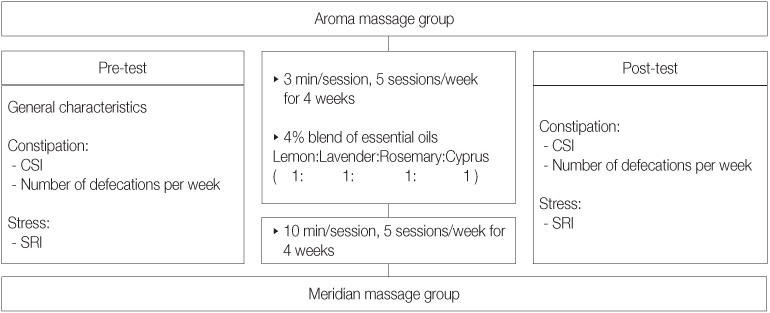
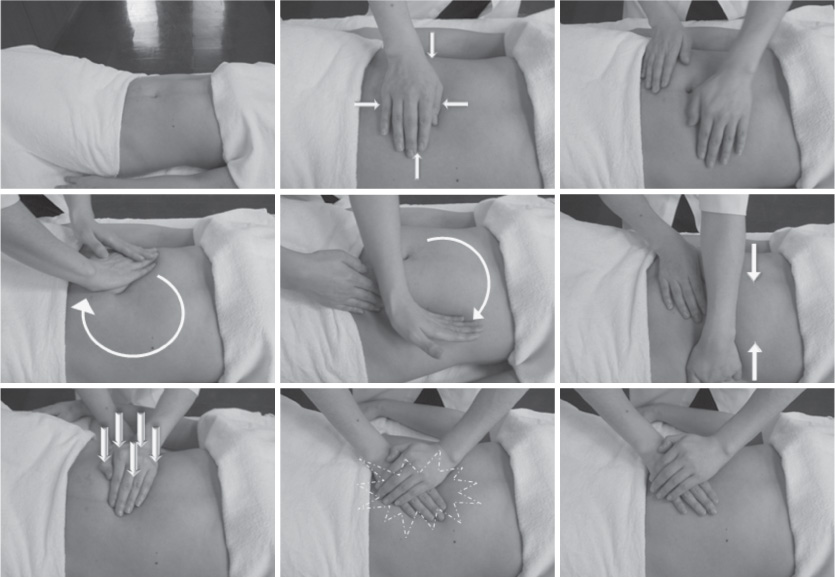
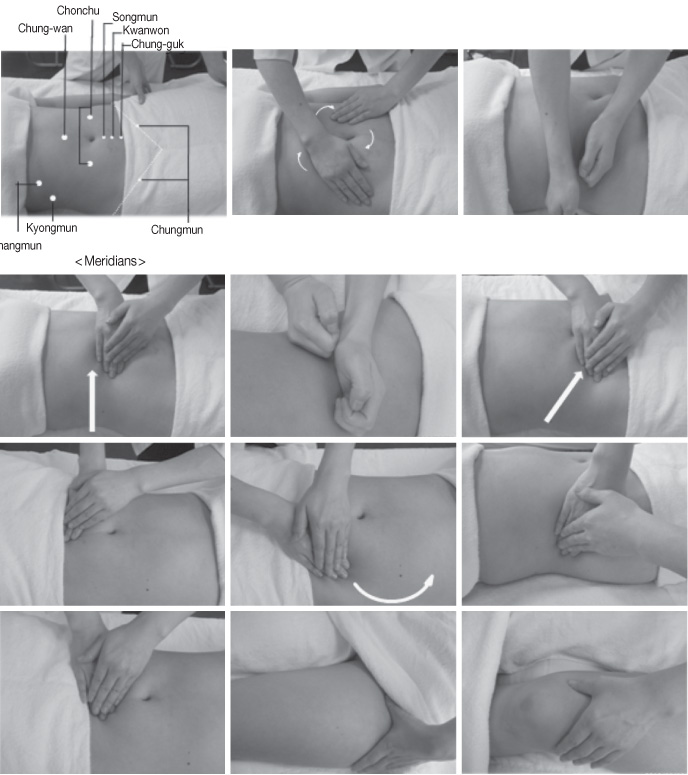
Figure 1
Figure 2
Figure 3
Homogeneity Test for General Characteristics and Bowel Movement of Participants
*Fisher's exact test.
Homogeneity Test of Research Variables
CSI = constipation severity instrument; SRI = stress response inventory.
Comparison of CSI Score, Number of Defecations, and SRI Score for the two Groups
a,b,c,d,e,f,g,h,i,j,k,l,m,n: Same letters are significantly different; G = group; T = time.
*Fisher's exact test.
CSI = constipation severity instrument; SRI = stress response inventory.
a,b,c,d,e,f,g,h,i,j,k,l,m,n: Same letters are significantly different; G = group; T = time.
 KSNS
KSNS
 E-SUBMISSION
E-SUBMISSION



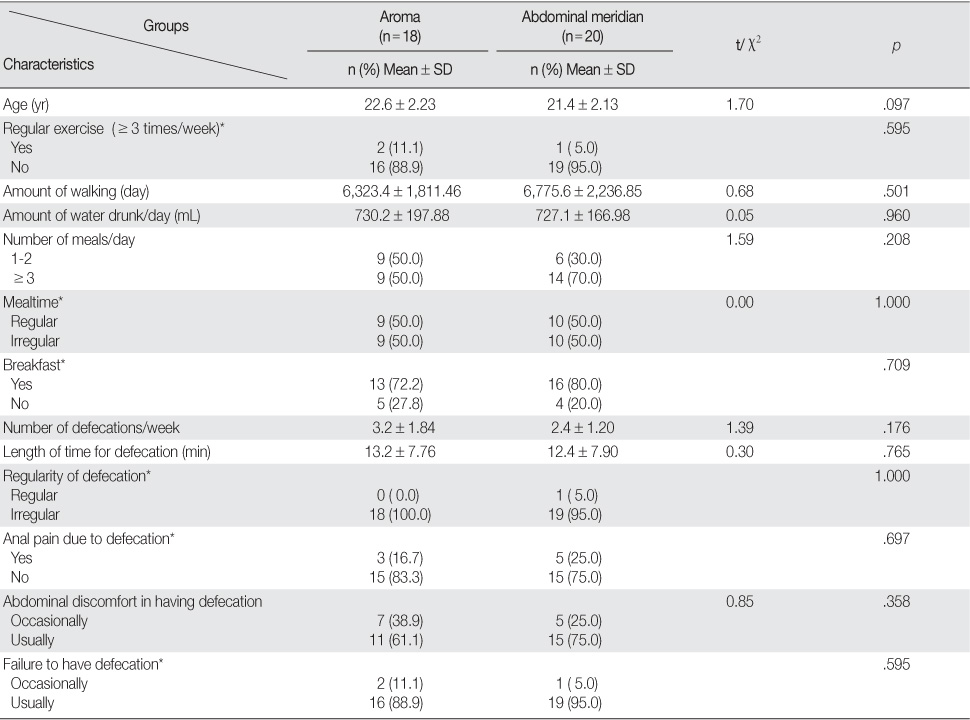
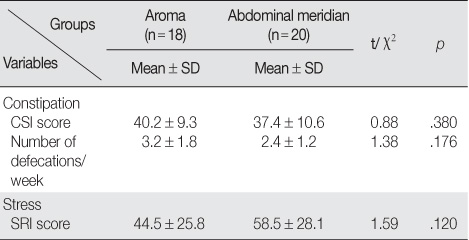
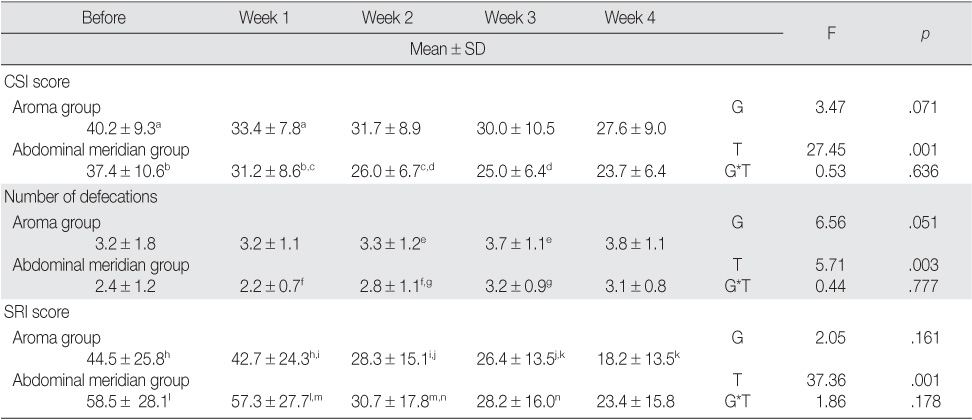
 Cite
Cite

